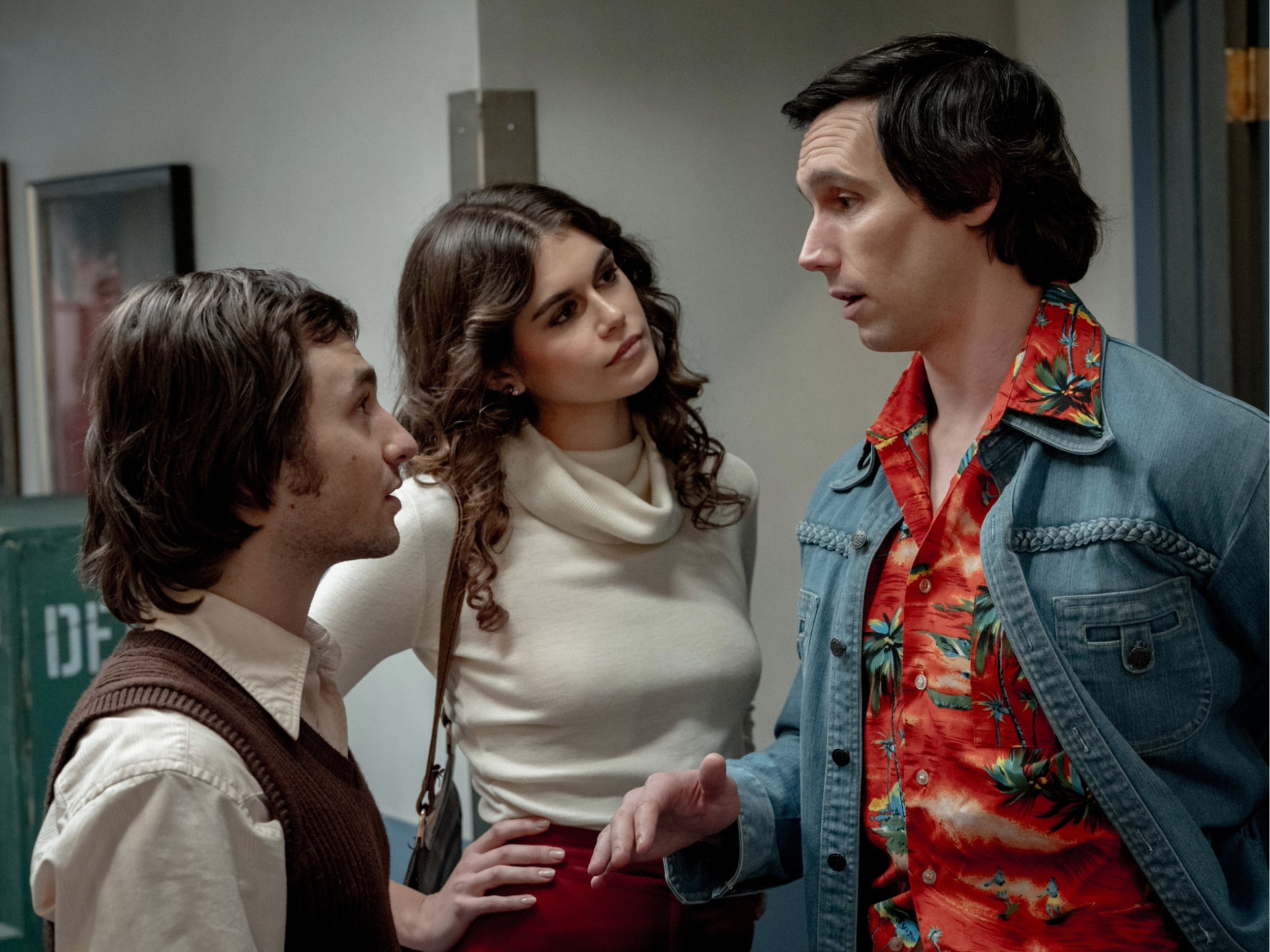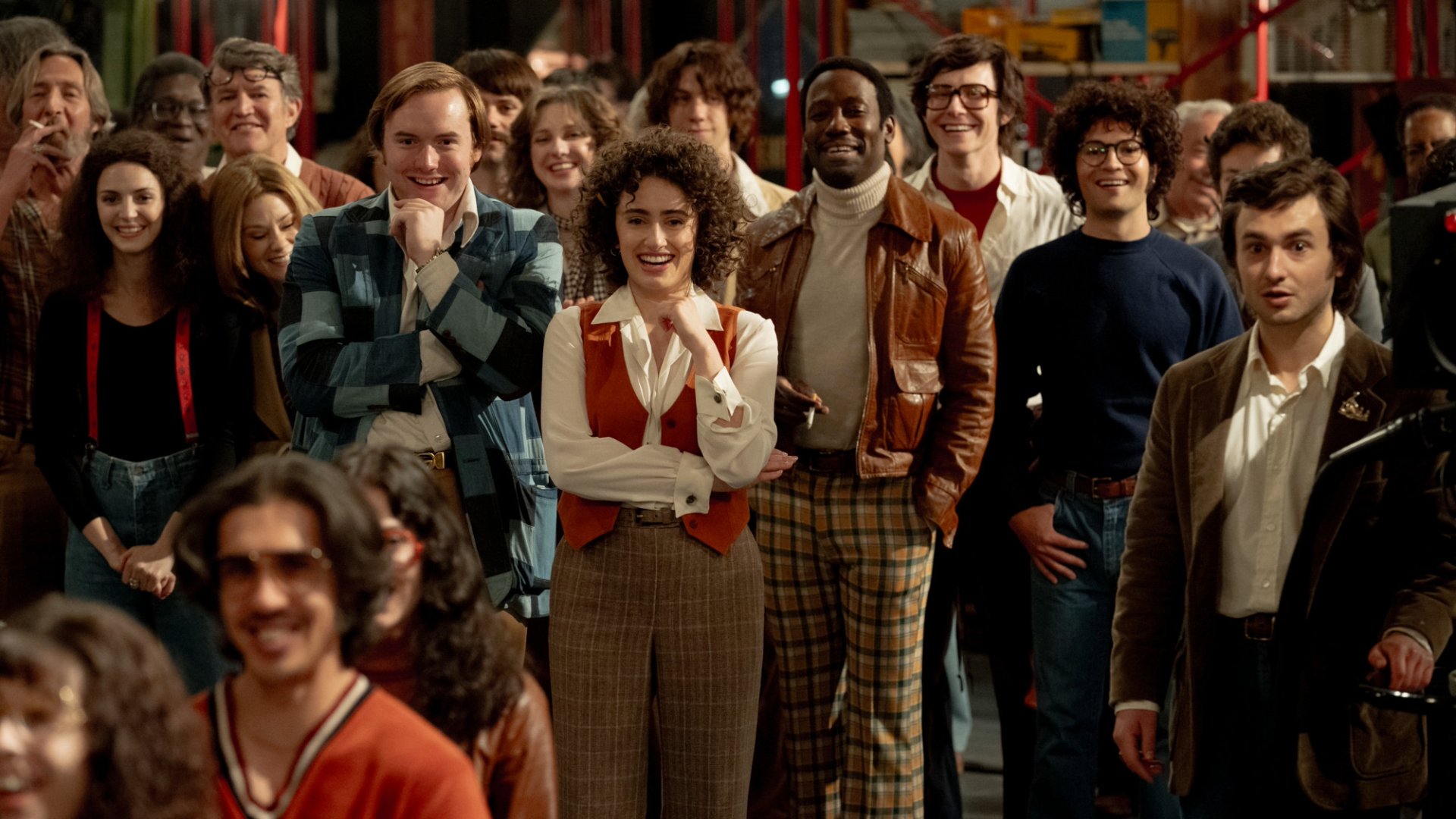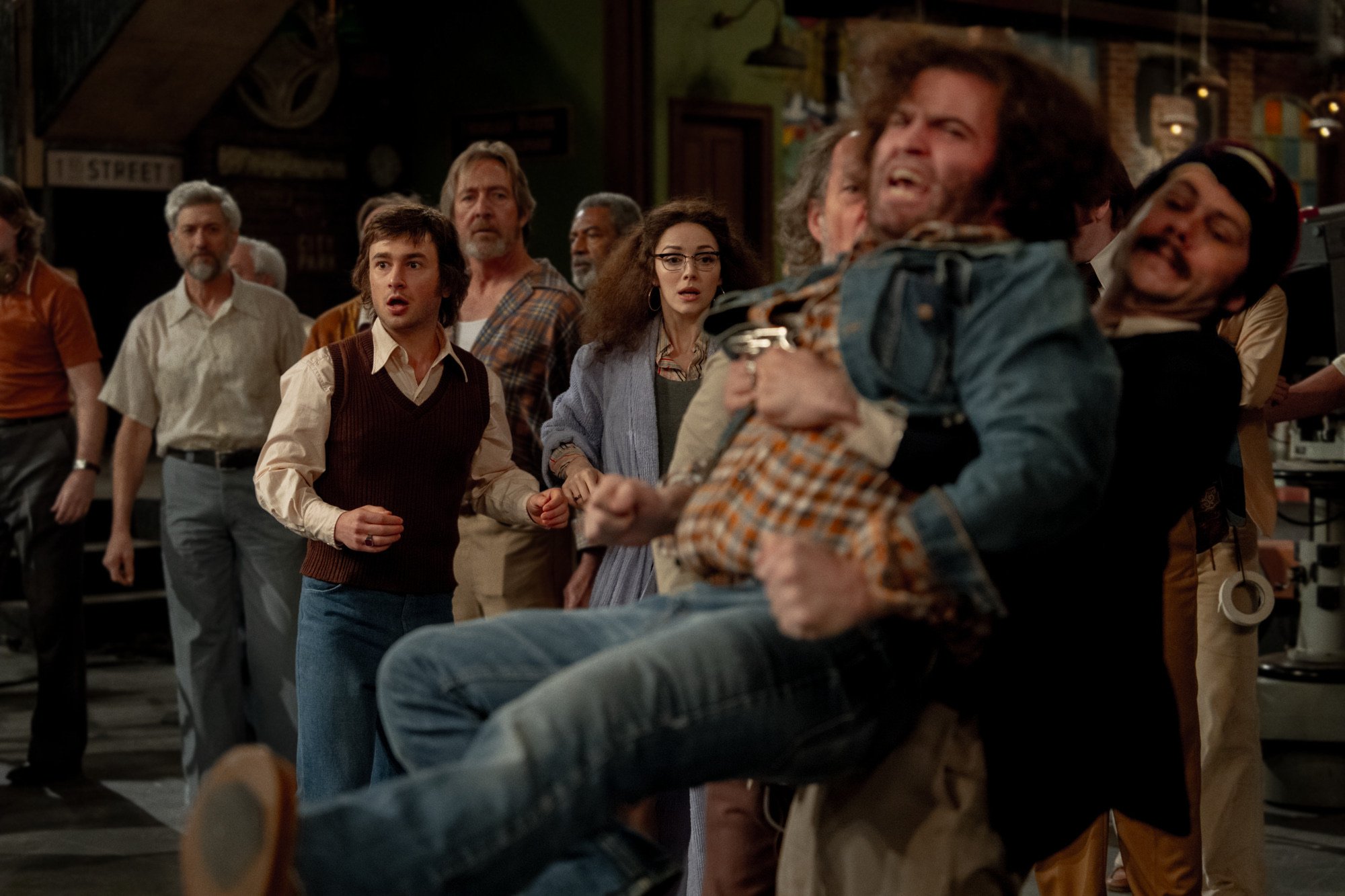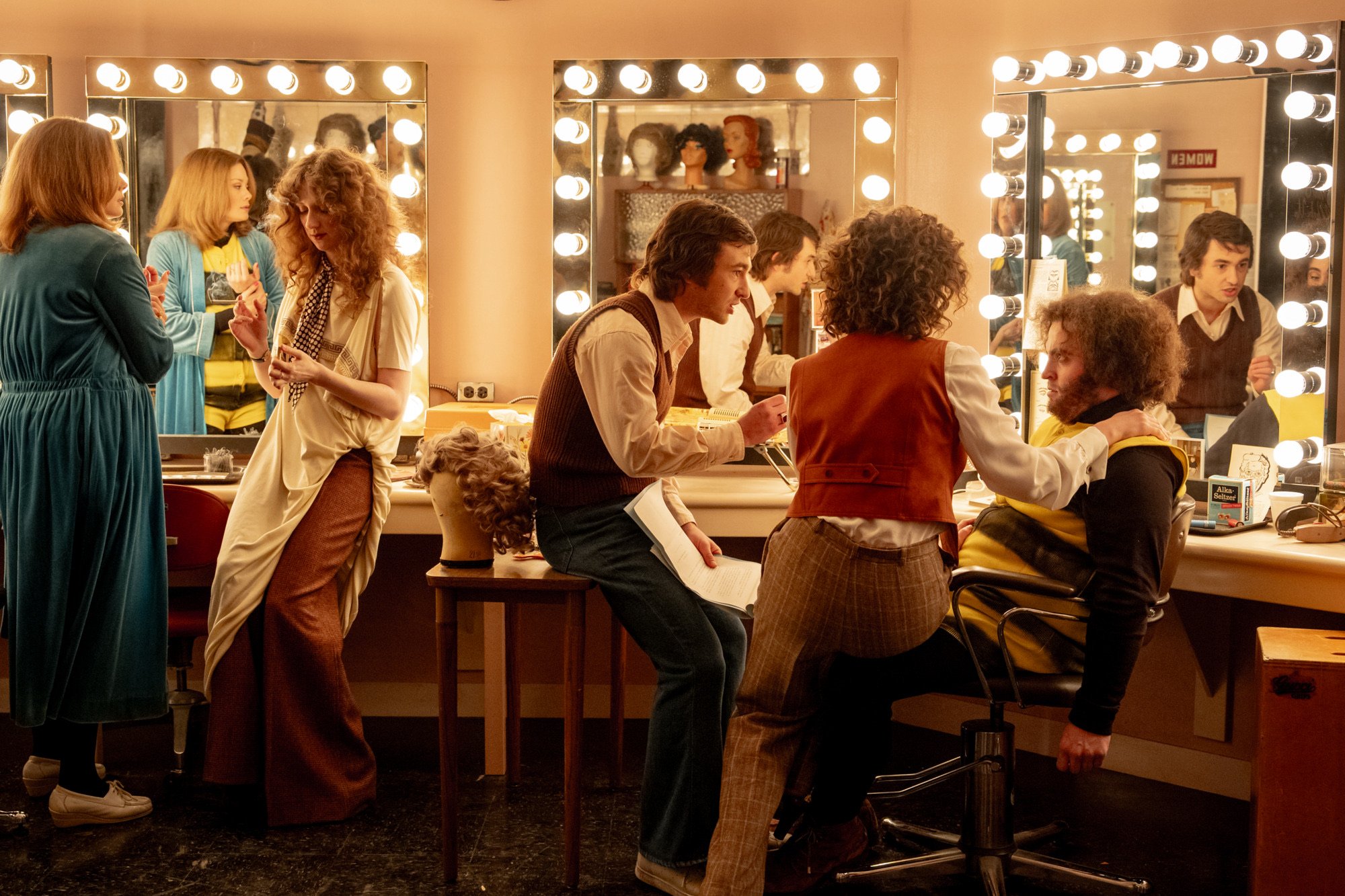
‘Saturday Night’ Review: Jason Reitman Turns ‘SNL’ History into Fan Fiction
An overindulgent production that would be better off as an episode of Drunk History or Documentary Now
‘Saturday Night’ Review: Jason Reitman Turns ‘SNL’ History into Fan Fiction

Just when you thought director Jason Reitman's quench for nostalgia juice stopped at his and co-writer/director Gil Kenan's grueling Ghostbusters movies, he swapped that ecto-cooler liquid for that Capri-SNL-un. Not just Saturday Night Live, but the first batch of cast members and writers who made the show stand out in the first place. Regardless of how you feel about SNL these days (please retire, Lorne), if it weren't for them, we wouldn't have some of the most iconic comedic movie stars and comedic sketch character actors in history. Reitman's latest, Saturday Night, which follows the 90 minutes that preceded the first broadcast, plays on that previous sentiment but with a hollow nostalgia-driven soul and a Birdman pastiche.

Image copyright (©) Courtesy of Sony Pictures Entertainment | Credit: Hopper Stone
R: Language throughout, sexual references, some drug use and brief graphic nudity.
Runtime: 1 Hr and 49 Minutes
Production Companies: Columbia Pictures, Reitman/Kenan Productions
Distributor: Columbia Pictures
Director: Jason Reitman
Writers: Jason Reitman, Gil Kenan
Cast: Gabriel LaBelle, Rachel Sennott, Cory Michael Smith, Ella Hunt, Dylan O'Brien, Emily Fairn, Matt Wood, Lamorne Morris, Kim Matula, Finn Wolfhard, Nicholas Braun, Cooper Hoffman, Andrew Barth Feldman, Kaia Gerber, Tommy Dewey, Willem Dafoe, Matthew Rhys, J. K. Simmons
Release Date: September 27, 2024
October 11, 1975, 90 minutes before the first live air date of Saturday Night Live, Lorne Michaels (Gabriel LaBelle) must wrangle his out-of-control cast of 20-something comedians, including Chevy Chase (Cory Michael Smith), Dan Aykroyd (Dylan O'Brien), an erratic John Belushi (Matt Wood), and crew members. While he has others at his side – like his wife and writing partner Rosie Schuster (Rachel Sennott) and young NBC exec friend and confidant Dick Ebersol (a wonderful Cooper Hoffman) – Michaels feels the pressure as he must appease a team of older cigar-smoking hard-to-please network executives. Amid Michaels' stress, the fresh comedians and their team of writers attempt to contend with their diverse personalities as the clock ticks toward 11:30.

Saturday Night's initial trailer laid out the feel of The Muppet Show if it featured the SNL crew in the characters’ shoes, and the final result had the same rhythm as one of the vignettes from Damien Chazelle's Babylon. Eric Steelberg's cinematography, moving through long corridors, and Jon Batiste's anxiety-inducing jazz score are primary factors that propel Reitman's atmosphere to capture an engaging and entertaining insanity. The film's kinetic movement in the pacing and tracking shots illuminates the hectic nature of any given office space setting, even when it's literally Saturday Night Live. As aforementioned, Reitman is completely emulating Alejandro Iñárritu's style in an unusual environment, but from a technical standpoint, it conveys the same vibe.

Saturday Night shines brightest when the skilled cast displays their talents in portraying these crew members, with Lamorne Morris as Garrett Morris, Dylan O’Brien as Dan Aykroyd, and Cory Michael Smith as Chevy Chase being noteworthy standouts. Sometimes my jaw would drop in disbelief over how these actors could capture the vocal patterns of these real people.

If you're a diehard SNL fan and wear the same nostalgia goggles as Jason Reitman, you’ll enjoy Saturday Night. Otherwise, it's very, "we have Birdman and Babylon at home," for it emulates those films' hectic energy in an unfitting environment. There’s no reason for Saturday Night Live to be depicted in a weird vérité style as if that first taping was anything revolutionary. The screenplay by Reitman and Kenan consists of neverending inconsequential vignettes between the cast and crew as the clock approaches 11:30, done in such a way that glorifies everyone who contributed to the show in any capacity, especially Lorne Michaels. The writers nail the personalities of the comics on paper, which isn’t saying much since Reitman grew up around many of the cast members. However, amidst the hurried energy, the dialogue is bare-bones. Despite the good performances, it feels as if you're ultimately watching this cast play dress-up. Lines spoken from LaBelle's Michaels go like, "John [Belushi], you’re gonna go down as one of the greatest character expressionists in history," as if it's a self-serving prequel to these (mostly late) people's careers is corny beyond belief. It tries hard to appeal to those SNL stans while alienating everyone else.

Saturday Night bears a large ensemble cast, and almost everyone gets a moment in the limelight… if you have a pair of balls on you. Gilda Radner (Ella Hunt) was a beloved performer, who helped gave SNL its legs. Here, she gets a trail mix of nothing, ultimately wasting an uber-talented Ella Hunt. The same goes for Jane Curtin (Kim Matula, who only has one notable scene featuring Morris) and Laraine Newman (Emily Fairn), who spends the movie doe-eyed over Aykroyd, jealous that Rosie Schuster (who broke up with Michaels but was still married to him on a technicality) was tapping that Aykroyd ass. The weirdest part is that the whole Newman and Aykroyd thing isn’t even based on any reality, so it comes across more like fan fiction, than the usual fictionalized for dramatic purposes discretion. They needed a Diablo Cody touch to add gender-equal action to the playground. As a viewer, I shouldn’t spend more time with irrelevant comedian Milton Berle (J.K. Simmons) than with Gilda Radner. The only woman with screen time and some character is Rosie Schuster due to her proximity to Lorne. And of course, Rachel Sennott kills it during her scenes.
There was no need for two Nicholas Braun characters. His role as Andy Kaufman is enough, but why give him Jim Henson too? You can tell the budget was low because Braun's Henson looks like something straight out of Spirit Halloween and it’s often embarrassing how awkwardly he portrays both characters.

Saturday Night is an overindulgent production that would be better off as an episode of Drunk History or Documentary Now. If the film were not in the hands of someone operating in starry-eyed mode by default, it could’ve provided some much-needed depth.
Rating: 2.5/5
































